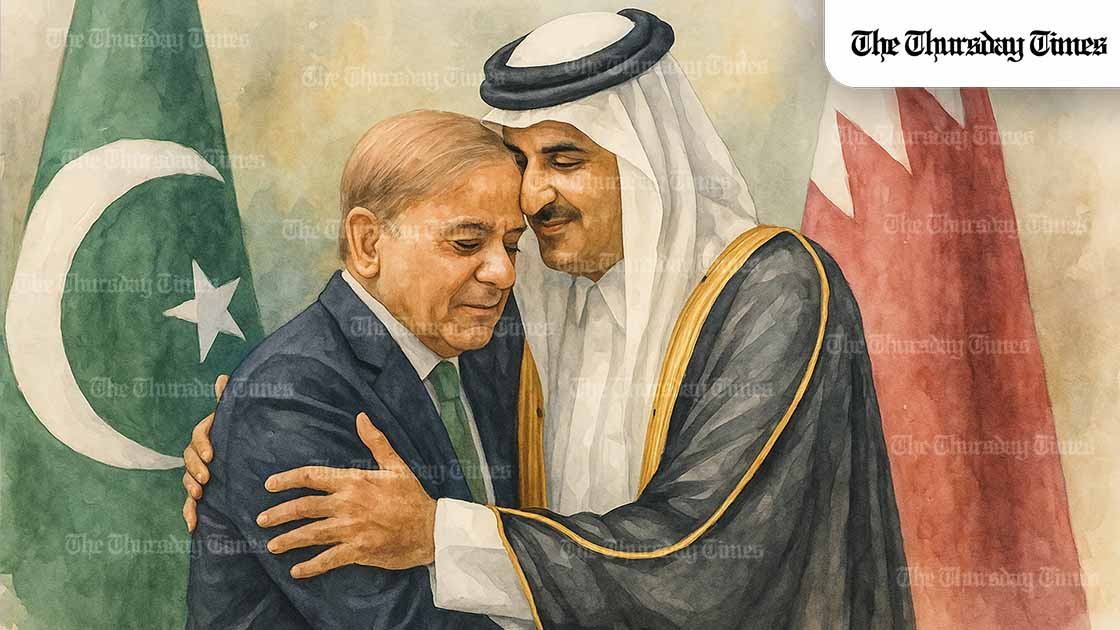HISTORY KNOCKED IN DOHA and the door was steel. A foreign state hit the capital of a sovereign Gulf nation; the blast was meant for militants, yet it tore into the idea that small states are safe so long as they are useful. In the silence after the sirens, a different kind of power stepped forward; not loud, not vengeful, but purposeful.
Israel’s strike in Doha was unprecedented; a line most capitals assumed would hold snapped in an instant. The attack missed the names that make headlines; it killed aides and a Qatari officer, and it scorched the diplomatic ground on which ceasefires are built. Qatar called it state terror; the region called it a breach too far. Even in Israel’s own security establishment, unease leaked out like light through a cracked door.
Pakistan moved quickly; phone calls, a condemnation, then a plane. Within forty-eight hours, Prime Minister Shehbaz Sharif was in Doha; not to posture, but to stand where a friend had been struck and say aloud that borders are not suggestions. It was theatre of a kind; the old diplomatic kind in which presence is the message and the photo op is the policy.
At the Amiri Diwan, the choreography was familiar; an Emir receives, delegations sit, phrases are chosen with care. Yet the subtext was not; Qatar’s sovereignty was not merely affirmed, it was ring-fenced by regional solidarity, and Pakistan placed itself at the edge of that ring. In a week of hot takes, this was a cold, deliberate signal.
Even in Israel’s own security establishment, unease leaked out like light through a cracked door.
New York added its own punctuation mark. The UN Security Council, with Washington’s support, condemned the strike; that sentence will be read closely in every capital that watches America’s hands as much as its words. If there is a hinge in this story, it is here; the United States chose to distance itself from a friend’s excess to steady an ally’s faith.
Doha then did what small, confident states do; it set the agenda. An emergency Arab-Islamic summit was called for Monday, not to grandstand but to force clarity. Pakistan will be there; it has already aligned its words with its footsteps. Summits can be hollow; this one is a test of whether the region can write rules it intends to keep.
Strip away the flags and the motorcades and the case is simple. If a state can be struck on its own soil without consequence, then sovereignty is costume jewellery; pretty, performative, valueless. If there is consequence, the chain holds; not forever, but long enough for diplomats to build something sturdier.
Pakistan’s calculus is not mysterious. It has skin in this game; LNG contracts, labour flows, diaspora ties, a neighbourhood that burns too often for comfort. More than that, it sees in Qatar a broker whose utility survived the blast; if ceasefires are currency, Doha still mints. To support Qatar is to support the idea that mediation is not a soft art; it is hard infrastructure.
There is another angle; inside Israel, this strike was contested. The reporting is stark; intelligence hands balked, timing was questioned, diplomacy was weighed and found heavier than the thrill of a calibrated punch. That matters; it shows that even in the fiercest states, strategy argues with impulse. It also shows why the region needs fewer cinematic moments and more durable arrangements.
Pakistan’s calculus is not mysterious. It has skin in this game; LNG contracts, labour flows, diaspora ties, a neighbourhood that burns too often for comfort.
Gulf confidence has taken a bruise; the belief that utility to Washington buys safety will not recover overnight. Yet bruises are teachers. The answer is not theatrical estrangement; it is diversification with discipline, a sovereignty doctrine written in practical clauses. If the United States wishes to be believed, it must keep saying what it said at the Council and keep acting like it means it.
So what should Monday deliver. First, a joint rule that political sanctuaries and mediation channels are red lines; attack them and you attack everyone who needs talks to end wars. Second, a legal track; not for vengeance, for precedent. Third, a quiet operational pledge among states that have real capacity; better air defences where it counts, better intelligence sharing when it matters, fewer surprises that invite escalation.
“Solidarity is not a pose; it is a policy.” That is the sentence I would hang in every chancery this week. Another follows it; “Sovereignty is not a slogan; it is a promise with a border.” And a third; “Mediation is not indulgence; it is maintenance of the peace that the brave keep losing.”
Pakistan’s trip to Doha did not change the map; it changed the mood. It reminded the region that steadiness is a choice; that outrage is cheap; that reassurance, delivered promptly and in person, is a currency allies still respect. It will not be the last visit of its kind; it should be the first of a habit.
In the end, this is not a story about who looked strong on television. It is about who showed up when it counted and spoke a simple truth quietly; if you make diplomacy dangerous, you make peace impossible. In Doha, restraint found a spine; power found its manners; and a small state said no, and was heard.




